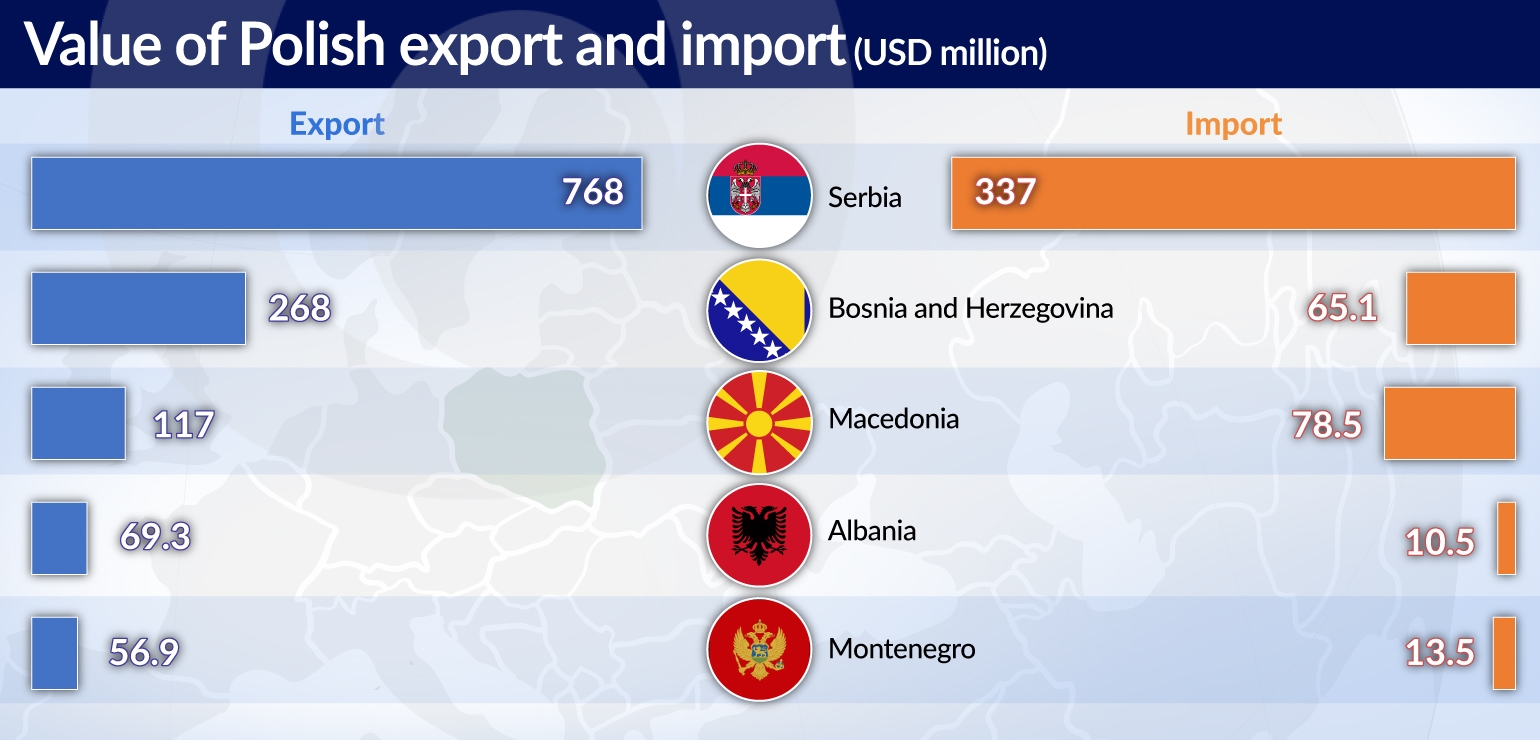Tydzień w gospodarce
Category: Trendy gospodarcze
Analyst in the Balkan Department at the Institute of Central Europe in Lublin, Poland

European future of the Balkans has been threatened by unsolved political problems accompanied by general socio-economic stagnation. While the first set of issues (like status of Kosovo, Bosnia and Herzegovina or Macedonia) seems to be impregnable, economic agenda could be influenced by the EU. Therefore, in 2014 Angela Merkel suggested a new approach, known as the Berlin Process.
It could be described as “European integration through regional integration”. According to its authors, the Southeast European countries should increase their economic cooperation in order to improve their situations. So far, due to the lack of funds, infrastructural backwardness, high level of corruption and general economic inferiority they are not able to benefit from the gradual integration with the EU.
Unlike the formal enlargement policy of the EU, with chapters, benchmarks and other formalities, the Berlin Process has been an initiative aiming at fighting corruption, improve investment climate, limit account deficits, development of energy networks and transportation.
Process of the EU enlargement, with its structure and logic of gradual integration, cannot be left untouched. It simply does not bring desired results. Poland’s economic involvement in the Western Balkans, although rather limited, reflects disadvantaged position of the Western Balkan states. In 2016, Poland exported to Serbia (the largest of the Balkan countries) goods for value of USD768m. At the same time Serbian export to Poland was USD337m. (Dis)Balance with other countries of the region is similar.
The same problems concerns trade balance between the Western Balkan states and the EU. According to Eurostat, since 2006 trade has more than doubled, and in 2017 exceeded EUR49.5bn. Despite this positive trend, and unfortunately for Southeast Europe, the EU notes permanent trade surplus. In 2008, it reached the highest value of EUR12bn, and the lowest level of EUR8bn was recorded in 2010 and from 2013 to 2016. In 2017, the surplus reached EUR9bn, almost the same as in 2007. Both imports and exports increased by around EUR11 bn.
Trade with the EU is beneficial to the Balkan states only relatively, and the EU member states are the side that benefits more. Subsequently, additional steps are required in order to boost local economies. Simple adjustment to the EU rules does not bring the results, which were expected during the accession of the CEE states. The individual economies of the Balkan countries are above all too small and too weak to compete with the EU.
During the Trieste summit in 2017, European leaders agreed on establishment of the Transport Community in the Balkans and adopted a plan for establishment of regional economic area, by deepening already functioning free trade area. The Regional Economic Area was intended to release the huge potential of around 20 million people, creating better and more sustainable economic opportunities for everyone and attracting more foreign direct investment.
It is based on existing Central European Free Trade Agreement of which the Western Balkans states are members (read more). CEFTA offers opportunities that the Balkan economies are not provided by the association or even membership in the EU. It frames exchange conditions for partners whose economic potential is more balanced. Such trade, in turn, favors steady development rather than stiffening divisions and inequalities.
After this initial success, the following summit organised in 2018 in London by the British government has been recognised by many external observers as a failure. Indeed the leaders, preoccupied with Brexit rather discussed the matters instead of proposing solutions.
Actual and effective increase of Poland’s economic involvement in Southeast Europe would be more than welcome by the Balkan leaders. One of the way of aiding Balkan economies would be adjusting their international obligation to the level of economic development, reflected for example in export value. Similar model was adopted in 1940s in the after-war Germany. The EU member states should be interested in economic growth, increase of purchasing capacity, etc. of the Balkan states.
Poland should neither ignore the existing achievements of the Berlin Process nor the challenges that this part of Europe face. Regional Cooperation Council, based in Sarajevo, BiH, suggested the following areas:
These are steps that need to be done as soon as possible by Poland in order to achieve a success next year in Poznań.
A true hope for the economic development of the Balkans is the IT sector. First of all, it does not require enormous financial inputs. An investor does not need to spend a lot on expensive transport infrastructure, like railway tracks, sidings, highways, viaducts, etc. Moreover, the IT industry is relatively mobile. The takeover of a steel mill, mine or car factory requires enormous financial, logistical and often political efforts, and — as it was the case with Polish investments in Croatia —does not guarantee the success.
Complications related to the IT industry are much more „mundane”. What’s more, a company investing in this sector assumes that it will be able to move quickly to another place in the case of any complications, for example the destabilization of a political situation. The IT industry also has the advantage that it produces goods of highly developed technologies, and thus causes the desired socio-economic development.
The European Commission has launched in Sofia a Digital Agenda for the Western Balkans (read more) in order to support the transition of the region to the digital economy and enable the benefits of digital transformation. The government in Warsaw, taking into account its efforts to build modern economy, should refer to and build upon this its relations with the Balkans and the upcoming summit will be a great opportunity to do this.
